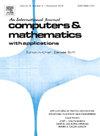基于PID控制器的胰腺癌治疗策略对疾病动力学和治疗干预的新见解
IF 2.9
2区 数学
Q1 MATHEMATICS, APPLIED
引用次数: 0
摘要
在本文中,我们开发了胰腺癌进展的数学模型,使用具有时间延迟的非线性偏微分方程(PDEs)系统,捕捉人体内的疾病动态。该模型代表了胰腺癌参与的六个关键细胞群:癌细胞(C)、胰腺星状细胞(P)、基质细胞(S)、细胞外基质降解酶(E)、肿瘤相关巨噬细胞(N)和免疫抑制细胞(I)。为了生物学可行性,我们通过连续性法和Banach收缩原理建立了模型的存在性和唯一性,并通过Lyapunov方法验证了模型的全局稳定性。敏感性分析确定了关键因素,如癌细胞分裂、基质细胞活化和免疫细胞浸润,作为有效治疗的靶点。最优控制和PID策略显示了限制癌症增殖和重新编程肿瘤微环境的潜力,而模拟强调了及时和持续干预的必要性。结果强调了早期手术和免疫调节在最大化治疗效果中的重要性,为个性化和适应性方法提供了新的见解,以改善胰腺癌治疗的患者预后。本文章由计算机程序翻译,如有差异,请以英文原文为准。
New insights into disease dynamics and treatment interventions with PID controller-based therapeutic strategies for pancreatic cancer
In this paper, we developed a mathematical model for pancreatic cancer progression using a system of nonlinear partial differential equations (PDEs) with time delays, capturing disease dynamics in the human body. The model represents six key cell populations involved in pancreatic cancer: cancer cells (C), pancreatic stellate cells (P), stromal cells (S), extracellular matrix-degrading enzymes (E), tumor-associated macrophages (N), and immunosuppressive cells (I). For biological feasibility, we established model existence and uniqueness via the method of continuity and Banach's contraction principle, with global stability verified through the Lyapunov method. Sensitivity analysis identified critical factors such as cancer cell division, stromal cell activation, and immune cell infiltration, as targets for effective treatment. Optimal control and PID strategies demonstrated potential in limiting cancer proliferation and reprogramming the tumor microenvironment, while simulations highlighted the need for timely and sustained interventions. The results emphasize the importance of early surgery and immunomodulation in maximizing treatment efficacy, offering new insights into personalized and adaptive approaches to improve patient outcomes in pancreatic cancer treatment.
求助全文
通过发布文献求助,成功后即可免费获取论文全文。
去求助
来源期刊

Computers & Mathematics with Applications
工程技术-计算机:跨学科应用
CiteScore
5.10
自引率
10.30%
发文量
396
审稿时长
9.9 weeks
期刊介绍:
Computers & Mathematics with Applications provides a medium of exchange for those engaged in fields contributing to building successful simulations for science and engineering using Partial Differential Equations (PDEs).
 求助内容:
求助内容: 应助结果提醒方式:
应助结果提醒方式:


